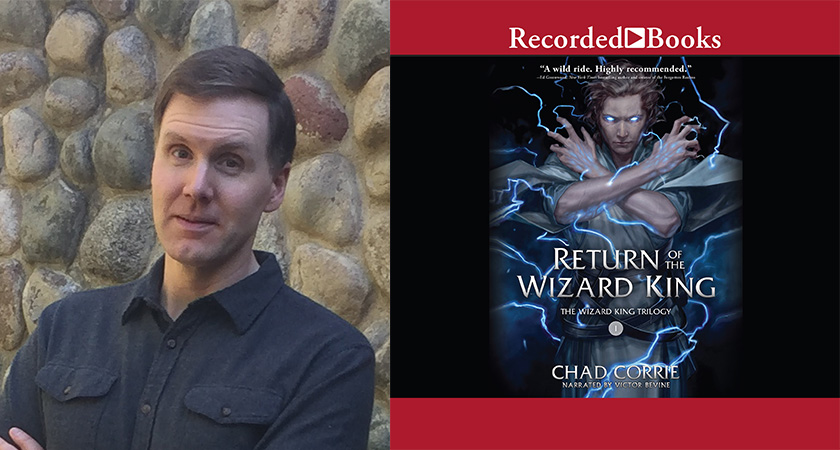Author Q&A: Chad Corrie
October 21, 2020


(Photo Credit: Joey Corrie)
Return of the Wizard King
The Wizard King Trilogy | Book One
After nearly eight centuries, the last wizard king seeks a return to Tralodren. But doing so requires the manipulation of a band of mercenaries oblivious to his goals.
The gladiator sold his soul for revenge. The knight’s a bigot. The dwarf only cares about regaining his honor. Even the wizardess seems too bookish for anyone’s good. But they’ve all been hired by a blind seer and his assistant to retrieve some forgotten knowledge long hidden away in a jungle-strangled ruin.
Get in. Get out. Get paid. At least, that’s what they thought. Instead, they uncover hidden agendas and ancient power struggles centuries in the making.
Welcome to Tralodren, a world rich in history, faith, and tales of adventure—of which this story is but one of many
Chad Corrie was kind enough to answer questions about Return of the Wizard King, his writing process, and the audiobook.
Author Q&A: Chad Corrie
Without giving too much away, what are Return of the Wizard King and the Wizard King Trilogy about?
In general Return of the Wizard King is meant to be the introduction to a fun and entertaining fantasy-based story wherein folks can just step back and enjoy some escapism for a while. In short, it deals with a group of mercenaries that are just looking to get in, get out, and get paid. Instead, they find themselves getting pulled along on this greater adventure that by the end of the trilogy has them dealing with some pretty impressive stakes, situations, and figures. Along the way they also have some issues and foibles that have to be worked out and through—which provides some additional conflict and further drives the story in various directions.
Given those unique issues you just mentioned for the characters were there any specific scenes or what you were particularly focused on in Return of the Wizard King when writing it?
There were a few scenes with Dugan I knew had to be in there and flow just the right way to work the best. And, of course, knowing how best to use the main antagonist in the story, given their unique relationship to events as they unfolded, was something given some extra thought early on.
But in general it came down to seeing how best each scene was informed and molded by where each character was and where the progression of the story had brought them. More than once I found myself surprised by some of actions the other characters took, which forced me to rework some of my previously laid out ideas for the plot and story. Thankfully, whenever those moments occurred the solutions weren’t too hard to come across, keeping the writing process more enjoyable than bearable.
And speaking of the writing process, what’s your favorite part of it? Least favorite?
Actually, there’s something to like about each part of the writing process. While I know some writers might dislike the editing part or the first draft and plotting or other aspects, I’ve learned to better enjoy the entirety of the process more than I have in times past.
If I had to say there’s a favorite part it might be when I reach a point in writing a story when I realize everything is coming together and the actual story is being created. Often when you first start on a new project—especially in something you’re not entirely familiar with at the time (like a newly created fantasy world)—you can sometimes have an intermediate period of trying to find your footing. But after you find it, there’s just a sense of greater connection to things and a higher level of confidence that yes, in fact, you might actually know what you’re doing.
Another moment that I tend to enjoy is when you go through the final edit and proof. For me that’s when I tend to get the most surprised, not so much by what is written, but amazed that it was something that came through me in the first place. Sometimes you’re so close to something you don’t really see the whole and when you’re finally able to do so it can be pretty fun and amazing—even humbling.
As to the least favorite part, perhaps it’s during those times of temporary shifts and adjustments to the tale I spoke about earlier, which can have you second guessing what needs changing and how to go about it—or even if you should, instead waiting it out and seeing if something else needs tweaking after that.
What was it like hearing something you wrote read as an audiobook for the first time?
Very interesting, educational, and entertaining. I had a great time working with all the awesome folks at Recorded Books who helped shepherd me through the process and kept everything running smoothly, even as various challenges arose throughout the year.
And while I learned a lot about the process and what went into it I was really surprised how much I enjoyed the audio version of the story. While I’d read, re-read, and edited the manuscript so many times by now I wasn’t sure I would want to listen to it again, but was glad I did. Victor Bevine did such a wonderful job of bringing his own unique talent and energy to the story that I found myself actively interested to know what happened next—and I wrote the story.
What’s your hope for people who will listen to Return of the Wizard King?
I’d like to think that same energy and enjoyment I had listening to it would be shared by new listeners. And that they’d enjoy a fun, entertaining story. That’s really the main gist of all that I write and create: telling fun, entertaining stories.
